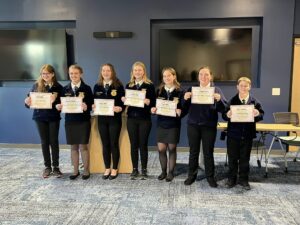Public speaking is a skill that is essential for success in many aspects of life. From job interviews to business presentations, being able to communicate effectively and persuasively is a valuable asset.
The Southside FFA Federation Public Speaking Contest held at the SOVA Innovation Hub, provided an opportunity for students to showcase their public speaking abilities. The Halifax County Middle and High School FFA chapters hosted the event, and one of their own, Evelyn Farmer, received second place in the senior prepared public speaking contest.
Evelyn’s speech on “The Importance of Social Media in Agriculture” caught our attention, and we were eager to learn more about her and the message she shared in her speech. In this blog post, we had the privilege of catching up with Evelyn to delve deeper into the topic of social media in agriculture.

Southside FFA Federation Public Speaking Contest Award Recipients. Evelyn Farmer pictured 3rd from the right.
“Take a second and close your eyes. Imagine you are scrolling through Facebook and you see all these ads for honey, soaps, and other rural businesses or farms. You become mesmerized by these products and decide to purchase them as a result of these advertisements. By doing this you are now a cog in the wheel of agriculture. Hello, my name is Evelyn Farmer and I am a member of the Halifax High FFA Chapter. Today, I will be stressing the importance of Agriculture in social media.
The presence of Agriculture in social media is important for many reasons. A few reasons are farmers and advocates of agriculture can use it to communicate; farmers use it to promote farms and products; and consumers use it for educational purposes. Social media has impacted agriculture communication, promotion, and agriculture education in my opinion for the better.
The first reason is, social media helps give farmers and rural business owners a voice. Social media gives you the right to create content that represents you and your farm or business. Therefore, allowing farmers to take back the narrative and show what farm life really looks like. Also, before social media, farmers could only congregate with other local farmers to conversate about their farms. Now, due to social media farmers can communicate with other farmers all across the world.
However, many are still behind when it comes to the new growth of social media (Varner 2018). This can create many lost opportunities to promote their farm and products. Promoting products locally can attract some business, but if you use social media, it reaches more people, which in return attracts more business. I have found that many farms and rural businesses use Facebook as a platform to advertise their livestock and products. Facebook is a great tool for farmers who are just starting to branch into social media. I’ve seen farmers using Facebook to sell things from goats, to honey, to soap, to fresh fruit, and even baked goods. My family owns a dog training and breeding business. Word of mouth has helped to attract some business, but our Cedar Hill Retrievers website and Facebook page has helped more people hear about us. When marketing isn’t a farmer or business owner’s core skill, social media can be a big help. For example, using hashtags can help people who are looking for the product see your business. One example of this is, if you use the hashtag #honeyforsale, when someone looks that hashtag up they will see your business or farm (Social B 2015).
The third reason is many people use social media for educational purposes. Social media is an effective way for farmers to educate consumers about what goes into the products they buy. Knowing about all the work that goes into making the things you enjoy will give you a new outlook, and make you appreciate farmers a little more.
Also, many schools don’t have agricultural education programs. So many young people learn about the importance of agriculture through social media. Some farmers or agriculture teachers make YouTube videos. These YouTube videos are often tutorials that show people how to do certain agriculture-related activities. For example, if a farmer made a video about how to start a compost pile you could watch the video and learn from it. You could even use the material you’ve learned to create a compost pile of your own.
People often use social media to keep up to date with the changes in the world. It is important to keep up with what is going on with the changes of agriculture around you and stay connected to the community. People in past years mainly used things like newspapers, television, and magazines, but with social media becoming more popular, it is easier to reach people via social media.
Social media helps build a bigger community of people who share the same interest in agriculture. When someone has a conversation with one person about an issue, it only helps that one person. If people share and discuss an issue on social media, it can reach many other people who may have the same question (Varner 2018). Social media helps to create a quick and easy way to build relationships with other people interested in agriculture. Social media helps make things like physical distance and isolation issues of the past. With the help of social media, we don’t have to live near someone to conversate about our interest in agriculture.
I recently had an interview with Christy Parker from Parker’s Farm in South Boston Virginia. Parker’s Farm is a Nigerian Dwarf goat farm that also sells rabbits. Mrs. Parker expressed to me that she feels social media has helped their business tremendously. She informed me that social media helps her show the goats that have impressive pedigrees and the registered dairy goats. She believes that social media shows her goats are raised in a good environment and are good quality. Mrs. Parker also shared that social media makes her feel more connected and in touch with the community. She told me that the social media platform she likes the most is Facebook. She said she likes Facebook more than other platforms due to the fact it is more interactive. Mrs. Parker let me know that she has recommended Facebook to other farmers that were having a hard time selling their products and livestock. (Parker, C. 2022)
However, there is a con about social media. On social media it is easy for false information to spread. For example, in 2019, Fairlife went viral on Twitter and Facebook. Activists had released a video they thought showed abuse from the milk company. This hurt Fairlife tremendously. People were protesting them; their products were being taken off shelves; and there was even a lawsuit filed against them. Despite this reason and situation, social media has also helped agriculture in many ways. Social media has made promotion, education, and communication so much easier (Elejalde-Ruiz 2019).
To drive my point home, if I could summarize the importance of agriculture in social media, it would be: farmers use it to promote farms and products, consumers use it for educational purposes, and farmers and advocates of agriculture can use it to communicate. I hope through this topic I’ve shared my passion for agriculture with you, and you will be encouraged to support agriculture on social media.”
____
Q: How do you spend your free time? What are your hobbies?
A: I spend much of my time outside or reading. I have a Nigerian Dwarf goat that I have raised from a bottle baby, and in the summertime, I am heavily involved with gardening.
Q: Give us some background on why you chose this topic?
A: I chose this topic because in this day and time most people are influenced or involved with social media in some way. Agriculture has not always been something that is popular or often talked about on social media, and it should be. I also chose this topic to inform people about how social media can impact Agriculture. I wanted to show how people in agriculture can use social media to their advantage and to better the field.
Q: Is there anything that wasn’t included in your speech that you would like to add?
A: I touched on mainly everything in my speech, but I do think it is truly important to stress the education factor. Many adults and young people did not grow up with the access to learn about the importance of agriculture. Social media gives them the tools to explore many parts of agriculture and why it is so important.
Q: In your opinion, what does the future of agriculture look like?
A: I think the future of agriculture is undecided. We will always have some type of agriculture field but what that looks like depends on us. If we continue to educate our future generations and advocate for agriculture, the future of agriculture should be bright and strong. I feel like the future of agriculture will be one pushing towards change and growth.
The future of agriculture may be uncertain but it is definitely growing and bright.
